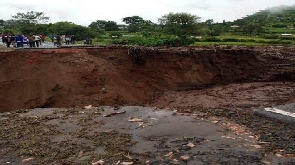A thorough investigation conducted by a team of Seismologists and Geoscientists from the Ghana Geological Survey Authority (GGSA), the National Disaster Management Organization (NADMO) and the Twifo Attimokwa District Assembly showed that the suspected earth tremor at Twifo-Mampong was a landslide.
The movement in the land on a steep hill with some cocoa plantations, according to GGSA, occurred after a downpour the previous day, Thursday, June 29.
Consequently, it assured the farmers in the affected areas to undertake their farming activities but to stay away from such areas when there are signs of rainfall.
Mr. Isaac Kuuwan Mwinbelle, the Acting Director-General, in a statement, said an investigation carried out on Tuesday, July 11 had residents in the area confirming that they did not feel the ground shook, but several cocoa trees were destroyed.
Many farmers in the area complained about a suspected earth tremor in the community, leaving large cocoa farms destroyed, a situation which forced the GGSA to authenticate their claim.
“The Authority wishes to state that, monitoring records from our network of seismic stations located across the country did not record any major earth tremor event from the stations on the said date.
“However, minor earth disturbances recorded during the period did not have the potential to cause the impact that was recorded.
The geological materials observed at the site were highly weathered metasediments, which were saturated from the heavy downpour, resulting in the movement of materials in multiple locations along the slopes of the hill,” Mr Mwinbelle said.
The area where the landslide occurred was far away from settlements and thus, did not affect lives and property.
The event, he however, said served as a warning for potential development along the slopes of the hill to be avoided and the need for proper enforcement of land-use planning.
He advised against development along slopes of hills, as such areas might not be stable for infrastructural development.
In addition, he advised Metropolitan, Municipal, and District Assemblies to enforce effective land-use planning to ensure public safety.
General News of Monday, 17 July 2023
Source: GNA
Suspected Twifo-Mamapong earth tremor was a landslide – GGSA
Entertainment












